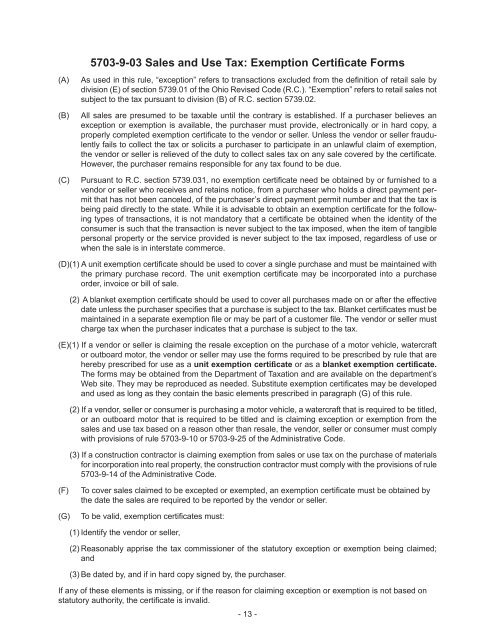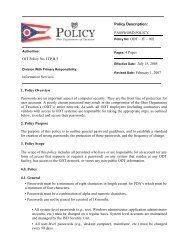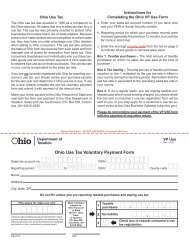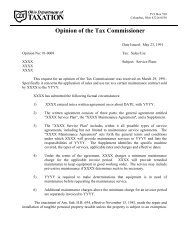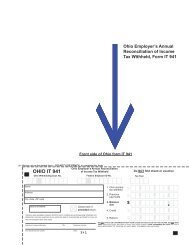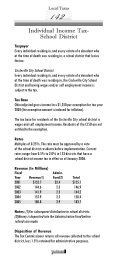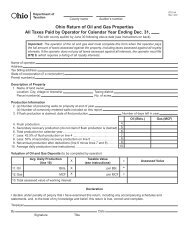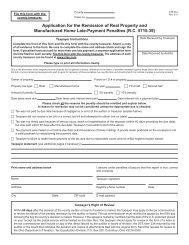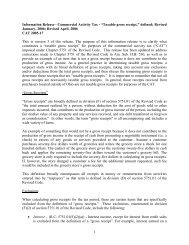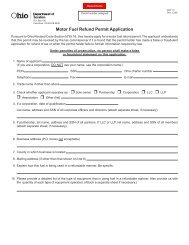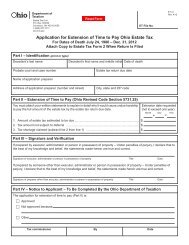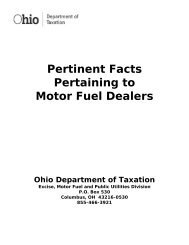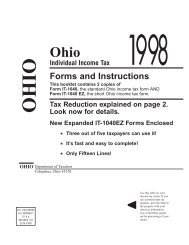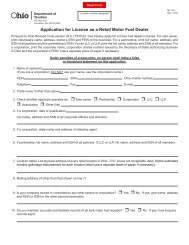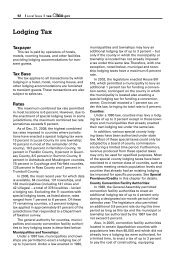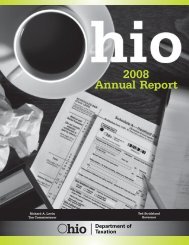The Small Business Workshop - Ohio Department of Taxation - State ...
The Small Business Workshop - Ohio Department of Taxation - State ...
The Small Business Workshop - Ohio Department of Taxation - State ...
Create successful ePaper yourself
Turn your PDF publications into a flip-book with our unique Google optimized e-Paper software.
5703-9-03 Sales and Use Tax: Exemption Certifi cate Forms<br />
(A) As used in this rule, “exception” refers to transactions excluded from the defi nition <strong>of</strong> retail sale by<br />
division (E) <strong>of</strong> section 5739.01 <strong>of</strong> the <strong>Ohio</strong> Revised Code (R.C.). “Exemption” refers to retail sales not<br />
subject to the tax pursuant to division (B) <strong>of</strong> R.C. section 5739.02.<br />
(B) All sales are presumed to be taxable until the contrary is established. If a purchaser believes an<br />
exception or exemption is available, the purchaser must provide, electronically or in hard copy, a<br />
properly completed exemption certifi cate to the vendor or seller. Unless the vendor or seller fraudulently<br />
fails to collect the tax or solicits a purchaser to participate in an unlawful claim <strong>of</strong> exemption,<br />
the vendor or seller is relieved <strong>of</strong> the duty to collect sales tax on any sale covered by the certifi cate.<br />
However, the purchaser remains responsible for any tax found to be due.<br />
(C) Pursuant to R.C. section 5739.031, no exemption certifi cate need be obtained by or furnished to a<br />
vendor or seller who receives and retains notice, from a purchaser who holds a direct payment permit<br />
that has not been canceled, <strong>of</strong> the purchaser’s direct payment permit number and that the tax is<br />
being paid directly to the state. While it is advisable to obtain an exemption certifi cate for the following<br />
types <strong>of</strong> transactions, it is not mandatory that a certifi cate be obtained when the identity <strong>of</strong> the<br />
consumer is such that the transaction is never subject to the tax imposed, when the item <strong>of</strong> tangible<br />
personal property or the service provided is never subject to the tax imposed, regardless <strong>of</strong> use or<br />
when the sale is in interstate commerce.<br />
(D)(1) A unit exemption certifi cate should be used to cover a single purchase and must be maintained with<br />
the primary purchase record. <strong>The</strong> unit exemption certifi cate may be incorporated into a purchase<br />
order, invoice or bill <strong>of</strong> sale.<br />
(2) A blanket exemption certifi cate should be used to cover all purchases made on or after the effective<br />
date unless the purchaser specifi es that a purchase is subject to the tax. Blanket certifi cates must be<br />
maintained in a separate exemption fi le or may be part <strong>of</strong> a customer fi le. <strong>The</strong> vendor or seller must<br />
charge tax when the purchaser indicates that a purchase is subject to the tax.<br />
(E)(1) If a vendor or seller is claiming the resale exception on the purchase <strong>of</strong> a motor vehicle, watercraft<br />
or outboard motor, the vendor or seller may use the forms required to be prescribed by rule that are<br />
hereby prescribed for use as a unit exemption certifi cate or as a blanket exemption certifi cate.<br />
<strong>The</strong> forms may be obtained from the <strong>Department</strong> <strong>of</strong> <strong>Taxation</strong> and are available on the department’s<br />
Web site. <strong>The</strong>y may be reproduced as needed. Substitute exemption certifi cates may be developed<br />
and used as long as they contain the basic elements prescribed in paragraph (G) <strong>of</strong> this rule.<br />
(2) If a vendor, seller or consumer is purchasing a motor vehicle, a watercraft that is required to be titled,<br />
or an outboard motor that is required to be titled and is claiming exception or exemption from the<br />
sales and use tax based on a reason other than resale, the vendor, seller or consumer must comply<br />
with provisions <strong>of</strong> rule 5703-9-10 or 5703-9-25 <strong>of</strong> the Administrative Code.<br />
(3) If a construction contractor is claiming exemption from sales or use tax on the purchase <strong>of</strong> materials<br />
for incorporation into real property, the construction contractor must comply with the provisions <strong>of</strong> rule<br />
5703-9-14 <strong>of</strong> the Administrative Code.<br />
(F) To cover sales claimed to be excepted or exempted, an exemption certifi cate must be obtained by<br />
the date the sales are required to be reported by the vendor or seller.<br />
(G) To be valid, exemption certifi cates must:<br />
(1) Identify the vendor or seller,<br />
(2) Reasonably apprise the tax commissioner <strong>of</strong> the statutory exception or exemption being claimed;<br />
and<br />
(3) Be dated by, and if in hard copy signed by, the purchaser.<br />
If any <strong>of</strong> these elements is missing, or if the reason for claiming exception or exemption is not based on<br />
statutory authority, the certifi cate is invalid.<br />
- 13 -


